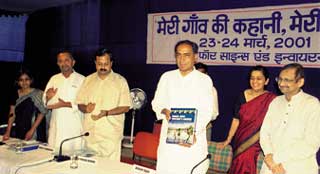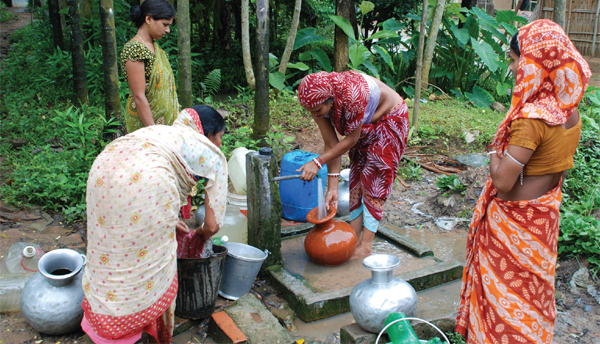
Confluence of thoughts
Water warriors from across India shared their experiences in harvesting water at a conference, which aimed to Make Water Everybody s Business

Water warriors from across India shared their experiences in harvesting water at a conference, which aimed to Make Water Everybody s Business

Rainwater is abundant in India. So is its mismanagement. This has led to a human made water scarcity. The only way to solve modern India s water crisis is to capture this bounty through traditional community based and urban water harvesting. A look into t
The importance of weather, climate, and water information is rising because of the need to minimize growing economic losses, serve more elaborate societal needs, and help countries adapt to climate change.
Slowing the rate of global warming over the near term by cutting short-lived climate pollutants to complement carbon dioxide reductions for the long term. Carbon dioxide (CO2) emissions are responsible
The study highlights the importance of strengthening institutions for environment management in sustaining and accelerating India's strong growth performance.
To bring the sufferings of women engaged in manual scavenging (WMS) into light and to explore solutions for the same, Jal Seva Charitable Foundation (WaterAid India), in collaboration with Association
Peatlands are unique and rare ecosystems that, despite only covering around 3-4% of the planet’s land surface, they contain up to one-third of the world’s soil carbon, which is twice the amount of carbon
This publication explores global urban development trends and proposes policy solutions for cities in developing and emerging economies to become centers of green and inclusive growth. Urbanization is
Ecological Security is all pervasive, all encompassing. It is not merely the flora, fauna, air, water and land. It is whole economics. One cannot separate Financial Security and Ecological Security.
<p>The demand for basic infrastructure and services in Indian cities has increased phenomenally due to rapidly growing <br /> populations. Such unmet demands often adversely affect the quality of urban life, the economic productivity, as well as the<br /> process of sustainable development. The main purpose of this brief is to highlight the problems involved in improving access to
The role of intellectual property rights (IPRs) in the transfer of climate change technologies has emerged as a particularly contentious issue in the past two years.
International transport, both aviation and maritime shipping, is a critical element of the global economy and trade. At the same time, it is also one of the main drivers of human-induced climate change. This background paper is intended to explore the many aspects of regulating international transport emissions in the context of trade.

Sustainable economic development has played a major role in the decline of global poverty in the past two decades. There is no doubt that competitive markets are key drivers of economic growth and productivity.
Carbon finance is now a proven tool to support greenhouse
The Transport and Communications Bulletin for Asia and the Pacific is published once a year by the Transport Division of the Economic and Social Commission for Asia and the Pacific (ESCAP). The main objectives
Junior minister for home affairs Swami Chinmayanand recently released a book titled 'Sustainable Rural Development for Disaster Mitigation' written by Satendra and V K Sharma. The book delineates
The Indian Biofuels Program began over 60 years ago but has gained significant momentum only in the past decade and especially in the past 5 years. While until early 2000 the major focus was on ethanol as a blending additive to gasoline, in 2003 the National Biodiesel Mission was established by the Planning
The rate at which indigenous Rice varieties are getting depleted is extremely alarming. It is becoming increasingly clear that to maintain biodiversity in farmers
This paper critically examines the clean development mechanism (CDM) established under Article 12 of the Kyoto Protocol in terms of its effectiveness as a vehicle for technology transfer to developing countries, a specific commitment under the UNFCCC.

<p>Sanitation continues to remain India's biggest failure with a large proportion of the nation's rural population still defecating in the open says this India Rural Development Report 2012-13</p>